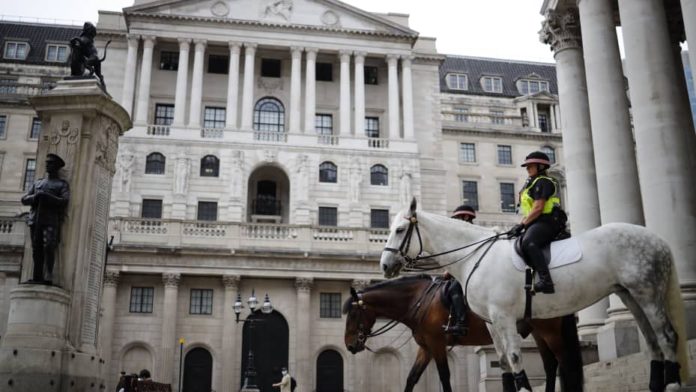LONDON: The Bank of England is set to keep its stimulus and record-low interest rate on Thursday but could follow the Federal Reserve in signalling when it will taper emergency support, analysts say.
The BoE’s monetary policy committee is expected to keep its cost of borrowing at 0.1 per cent and maintain its cash stimulus pumping around the UK economy at almost £900 billion ($1.2 trillion, 1 trillion euros), despite high inflation.
The decision, due at 1100 GMT, comes as global central banks grapple with when to withdraw ultra-loose monetary policy and massive stimulus as Covid-blighted economies start to recover.
The Federal Reserve on Wednesday said it would soon begin tapering its own emergency aid.
The Bank of Norway on Thursday became the first member of the G10 group of major currencies to hike borrowing costs since the onset of the pandemic.
The Swiss central bank kept its loose monetary policy in place as it lowered the country’s 2021 growth forecast.
‘Signal’ on tapering?
“There is unlikely to be any movement from the Fed’s counterparts at the Bank of England later today, despite inflationary pressures,” said AJ Bell analyst Russ Mould.
“However, there will be an expectation of some kind of signal on when its own asset purchases will be scaled back and if a UK rate rise could be in prospect next year.”
Central banks have embarked on huge purchases of commercial bonds, resulting in massive cash amounts swirling around the world economy.
Some analysts argue that this fuels inflation, which is on the rise in any case after the pandemic caused supply shortages.
Risk of stagflation
The central bankers remain wary of stagflation, a vicious mix of low economic growth and runaway inflation.
Annual UK inflation surged in August to 3.2 per cent, nearing the highest level in a decade, after the nation emerged from lockdown.
It comes as Britain’s economic recovery is slowing even before the end of the government’s furlough jobs support scheme next week that is widely expected to spark rising unemployment.
Growth in the UK’s private sector slowed to a seven-month low in September as a result of supply chain disruption, inflation pressure on raw materials and staff shortages, a key survey showed on Thursday.
Added to the mix are record-high gas prices, sparking fears of rocketing energy bills as demand peaks during the cold northern hemisphere winter.
About 1.5 million consumers in Britain have seen their domestic energy suppliers go bust in recent weeks as a result of chronic turmoil in the market.
The BoE warns that inflation could soon strike 4.0 per cent, double its target, but believes this spike will be temporary.
Governor Andrew Bailey argues that recovery is flattening as a result of the pandemic and global supply chain bottlenecks.
Capital Economics analyst Ruth Gregory said the bank “is getting closer to raising interest rates, but the gloomy tone of the recent news on the global and UK economies will have reduced the pressure to tighten policy”.
The inflation outlook was compounded this week by soaring energy costs that prompted a shortage of carbon dioxide — which is vital for the food industry.
The CO2 shortage triggered warnings of further pressure on food supplies and prices, which are already being hard hit by insufficient numbers of lorry drivers.
